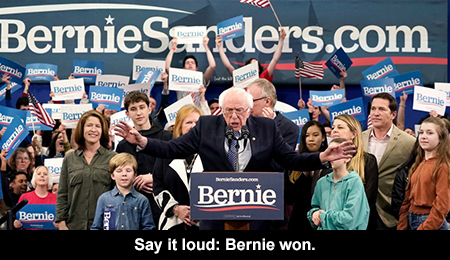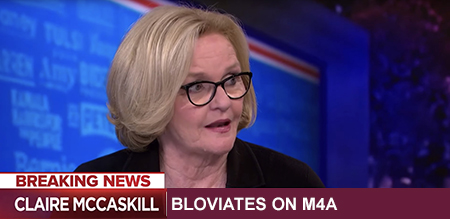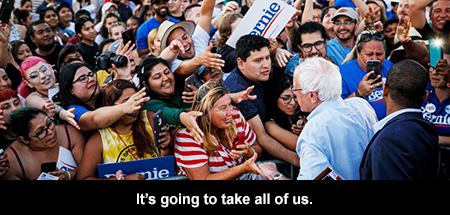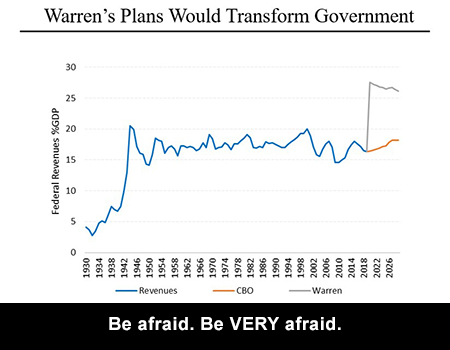
Sometimes I think my head is going to explode. Every get that way? It sometimes happens over stupid shit, like earlier this week when the MS Office install stopped working on my two-year-old PC, and Bill Gates’ automated tech support tried to trick me into buying a subscription to Office 365 rather than just reinstalling my Office 2016 once-and-done version. Hate when that happens, don’t you?
That’s not what really made my head explode this week. The true culprit was our ridiculous political culture – you know, the one that whines incessantly about how expensive Medicare For All will be (i.e. trillions of dollars less than what we’re spending now) but then turns around and drops two trillion dollars on saving Trump’s political bacon (they wanted to spend six trillion). Suddenly, all this money appeared out of nowhere.
And like the financial crisis, Congress’s piece is just the down payment. As David Dayen explained on Majority Report this past week, the $425 billion fund managed by Steve Mnuchin (the foreclosure king) will serve as initial capital in a Federal Reserve program that will direct more than ten times that amount towards select businesses – big banks, etc. – in the form of low-interest credit. Dayen refers to it as a money cannon, and he’s not wrong. There will be oversight in the form of an inspector general and an oversight board, but the review will be after the fact. It’s deja vu, all over again.
Sure, presumably every worker/taxpayer in America will get some kind of check. But the point is the bailout – the prole checks are just for window dressing. The bishops of austerity in the Senate are already whining about expanded unemployment benefits being too generous to people who are not working, as if there’s some moral hazard in paying people not to spread the Coronavirus. I’m not hearing them complain about trillions in public money being dropped on private enterprise, which will turn around and enrich themselves rather than use it for productive purposes, like hiring people. I’ve heard some vague hand-waving about the American people having a stake in the beneficiary industries, but this isn’t going to happen. Like the Wall Street and Detroit bailouts, there are very few strings attached to this money.
If we hand trillions of dollars out to private companies, we should own those companies. If we own those companies, we should put their workers in charge of managing them. If capitalism requires the government to resuscitate it every ten or so years with massive injections of socialism, we should start to rethink our system and, perhaps, pursue a vision of society that doesn’t entail crash-and-burn collapses every time something goes wrong … a vision that would emphasize social cohesion and a more robust approach to preparedness, involving – I don’t know – an exponentially larger number of, say, ICU beds, respirators, freaking PPE, for when the next plague comes strolling along.
We determine what’s possible. It’s just a question of political will.
luv u,
jp





 based on the pool of employees covered by the plan. If there are a lot of illnesses in a given year, that sends the premiums through the roof. The only way to control costs is to a) get everyone in the freaking country into the same pool, and b) cut the profit out of it entirely so that, as with Medicare, practically all of the money goes to patient care.
based on the pool of employees covered by the plan. If there are a lot of illnesses in a given year, that sends the premiums through the roof. The only way to control costs is to a) get everyone in the freaking country into the same pool, and b) cut the profit out of it entirely so that, as with Medicare, practically all of the money goes to patient care.  all. Well, that may work for bread. I’m not so sure about anything else. I mean, if you need a car, and you ask your spouse to go out and find one for you, and s/he comes back with one axle, a steering wheel, three tires, and a seized engine, you still are not going anywhere. Same deal, it seems to me, with health care. For all the cautionary comments about “not letting the perfect be the enemy of the good,” we really do not have a whole car here, so far as I can see. For one thing, they stripped out the most popular provisions, namely, the public option and Medicare expansion – features that would benefit people immediately, save money, and make for a much more reasonable system.
all. Well, that may work for bread. I’m not so sure about anything else. I mean, if you need a car, and you ask your spouse to go out and find one for you, and s/he comes back with one axle, a steering wheel, three tires, and a seized engine, you still are not going anywhere. Same deal, it seems to me, with health care. For all the cautionary comments about “not letting the perfect be the enemy of the good,” we really do not have a whole car here, so far as I can see. For one thing, they stripped out the most popular provisions, namely, the public option and Medicare expansion – features that would benefit people immediately, save money, and make for a much more reasonable system. Well, let me tell you why. Because too many people would opt for it. That doesn’t work for the money-drenched cretins that the insurance companies have sent to Washington to represent us. I’m afraid I have to include my own congressman, Michael Arcuri, in that number. He has thrown up his hands on health care, and while I wouldn’t blame him for not supporting the Senate bill, he should join with progressives in trying to pass some reasonable version that has a strong public option. They put the scare into him, and the insurance lobby is buying lots of T.V. time in our market telling people to call Arcuri and have him vote against the bill (which, ironically, he has already said he will do). Don’t just sit there and vote no, Mike – pull together with some of your colleagues and make it better.
Well, let me tell you why. Because too many people would opt for it. That doesn’t work for the money-drenched cretins that the insurance companies have sent to Washington to represent us. I’m afraid I have to include my own congressman, Michael Arcuri, in that number. He has thrown up his hands on health care, and while I wouldn’t blame him for not supporting the Senate bill, he should join with progressives in trying to pass some reasonable version that has a strong public option. They put the scare into him, and the insurance lobby is buying lots of T.V. time in our market telling people to call Arcuri and have him vote against the bill (which, ironically, he has already said he will do). Don’t just sit there and vote no, Mike – pull together with some of your colleagues and make it better.